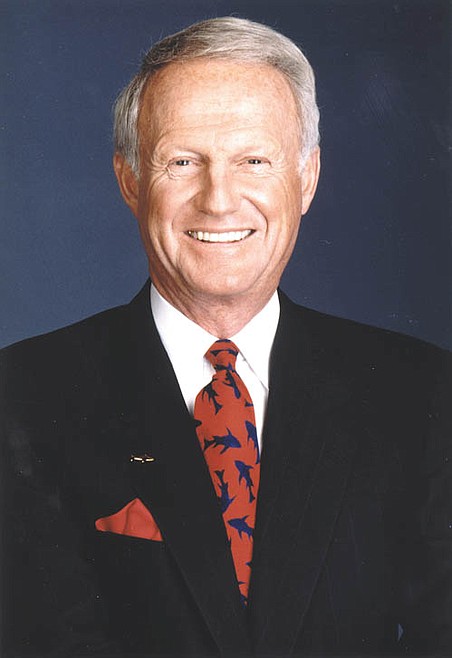Get yourself connected: The writing's on the wall
HARVEY MACKAY | Coeur d'Alene Press | UPDATED 10 months, 4 weeks AGO
Charlie Brown's friend, Linus, made the mistake of confessing to his big sister, Lucy, that he wanted to be a doctor when he grew up. Lucy was astounded at her brother's declaration and said, "You, a doctor! That's a laugh! You could never be a doctor! You know why? Because you don't love mankind! That's why!"
Linus immediately responded, "I love mankind! It's people I can't stand!"
Linus was expressing a feeling shared by many. The difficulty and challenge come in developing one-to-one relationships. Unfortunately, if we don't cultivate our relationships, we feel alone and stressed, which breaks down our health.
Harvard recently released a research project study — the longest in-depth study of physical and mental well-being among adults. It began in 1938 with 724 participants, 268 Harvard sophomores and 456 young adults from Boston. It followed the first generation of participants through their adult lives — from teenage years all the way to age 80 — and included 1,300 descendants from the original participants. The key conclusion was that having close connections with spouses, family, friends and social circles makes people happy and healthy. Turns out that the emotional stimulation of meaningful relationships is the prescription for better emotional, mental and physical health.
People truly crave connection. In today's polarized and politically charged world, this need for connection is more urgent than ever. The world doesn't just need "love, sweet love," as the '70s song suggests. What we need now is a profound, transformative connection that transcends surface-level interactions and unites us in a more meaningful way.
This idea is at the heart of Joe Sweeney's new book, "The Power of Connection." Sweeney is a New York Times bestselling author, an executive coach and a top speaker. (Check him out at www.Joesweeney.com.)
In the book, Sweeney introduces a simple yet profound three-part mantra: Connect more deeply with your truest self, connect with others and connect with a power greater than yourself — call it God, the universe or something divine. These connections are not luxuries; they are essential to living a fulfilled and purpose-driven life.
Sweeney says: "If we take a closer look at our society today, we'll see a culture plagued by addiction in many forms — whether it's substances, technology or the constant need for validation. The opposite of addiction is not sobriety — it is connection. People turn to these destructive habits not because they're weak, but because they feel disconnected from themselves, their loved ones and their communities."
He added: "What unites us is far more powerful than what divides us, but we have to be willing to take the first step toward deeper connection."
St. Francis of Assisi said it best: "(I)t is in giving that we receive." This wisdom reminds us that connection is not about taking or winning — it is about serving and sharing. Imagine if this mindset were embraced by our leaders, who often seem more focused on self-preservation and "winning" than on building bridges. Genuine connection requires vulnerability, humility and a willingness to see the humanity in others, even those with whom we disagree.
So how do we begin to build these connections, especially in such a fragmented world? Here are a few principles from Sweeney's book that, if practiced and adopted could transform our communities, workplaces and political arenas:
1. Release control: Let go of the idea that you need to be right, in charge or always in control. Connection thrives in humility, not dominance.
2. Listen with intention: True connection begins with genuine listening. Instead of waiting for your turn to speak, seek to understand the other person's perspective fully.
3. Give more than you take: Whether it's your time, energy or attention, giving opens the door to meaningful relationships.
4. Embrace vulnerability: Acknowledging your own imperfections makes you more relatable and human, creating space for authentic connections.
5. Find a higher purpose: Whether through faith, meditation or service, connecting to something greater than yourself fosters a sense of belonging and gratitude.
We all need each other. Here's a final story to illustrate my point. Two cows grazing in a pasture saw a milk truck pass. On the side of the truck were the words, "Pasteurized, homogenized, standardized, Vitamin A added."
One cow sighed and said to the other, "Makes you feel sort of inadequate, doesn't it?"
We too are inadequate without quality, cooperative relationships. People are the supplement that makes our life better!
Mackay's Moral: As the world changes, one thing will remain constant: the connections you develop over a lifetime.
• • •
Harvey Mackay is the author of the New York Times bestseller "Swim With the Sharks Without Being Eaten Alive." He can be reached through his website, www.harveymackay.com, by emailing [email protected] or by writing him at MackayMitchell Envelope Co., 2100 Elm St. SE, Minneapolis, MN 55414.

